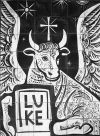
The Gospel of Luke
The Life of Faith: 17,1-10
There are four sayings in these verses: verse 1-2 on scandal; 3-4 on forgiveness; 5-6 on faith and 7-10 on duty.
For the first three sayings we do find parallels, especially in the Gospel of Matthew. However, the unit as a whole has been arranged so that it is unique to Luke.
The unit ends in 17,10 with a note of duty which is the opposite of the stumbling at the beginning, 17,1.
The key word in verses 1 & 2 is "scandal". That's the Greek word which has entered English. Literally it means a stumbling block - or rock linked to the millstone of verse 2.
The first four verses are about life in the community breaking down. The call is for repentance and constant forgiveness (verses 3-4). In Matthew too, this comes in a discourse about community life though there it is Peter who asks a question (Mt 18,21-22).
It is not surprising therefore that the apostles in 17,5 ask the Lord for an increase in faith. Luke has used these two verses quite differently to Mark and Matthew. In those Gospels it is about the withered fig tree and moving mountains (Mk 11,20-25). Here it is about community life introduced by the request for faith from the apostles.
Both "apostle" (9,10) and "Lord" (7,13) reflect the life of the early Church more than the life of Jesus himself. In the Acts of the Apostles it will be the apostles who are the leaders of the community.
Jesus' response in 17,6 therefore shows how a little faith (the mustard seed) can cause a mulberry tree to be planted in the sea. Faith is a response to God and a little faith therefore can achieve great things. "Planted" is unique to Luke. The sea is a place of chaos for the ancients The reference would seem to be the church's future mission planted in the chaos of the world.
The demand therefore is for a life of duty, the parable of 17,7-10. Slaves are totally at the command of their owner, they are his property. It is a demanding message just as the slave has to wait for his own meal after a long day's work in order to serve his master. A sense of duty by all is needed to keep the community together. The alternative is scandal.
Let us return to the main page.
The Sunday Gospel
Lk 17,5-10 is to my mind an unsatisfactory Gospel reading because it presents only the second half of the incident. We have now seen how the whole of 17,1-10 forms a unit fashioned by the evangelist. The request for faith by the apostles therefore arises out of what Jesus has said about scandals and forgiveness in the previous verses.
The reading from the prophet Habbakuk seeks to answer the age old question of the presence or absence of God during times of persecution and injustice. Looking at the whole passage, Hab 1,2-2,5, we see there are two queries by the prophet with two answers by God. Here we are presented with the first query by the prophet and the second answer from God. The point though is made, just where is God given the injustice in the world. To some extent this provides the context for the Gospel given in the missing 17,1-4.
The reading is most famous for its last line (Hab 2,4): "the righteous shall live by their faith". The way that St Paul quotes this phrase (Romans 1,16-17) led to major controversy at the Reformation concerning justification by faith alone. The Letter to the Hebrews (Heb 10,37-38) is closer to the original meaning when it quotes this verse as a starting point to the long chapter (Heb 11) on perseverence in faith.
Let us return to the main page.
